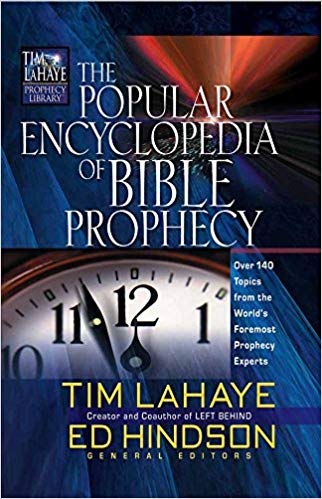AGES OF TIME Part II

THE POPULAR ENCYCLOPEDIA OF BIBLE PROPHECY
AGES OF TIME Part II
Christ’s Perspective of Bible Prophecy
Jesus uses the same vocabulary in the same way when He says in Matthew 12:32, “Whoever speaks a word against the Son of Man, it shall be forgiven him; but whoever speaks against the Holy Spirit, it shall not be forgiven him, either in this age or in the age to come.” Christ clearly distinguishes between the present age and the age to come. Meyer (vol. 1, p. 342) says, “‘This age,’ is the period previous to the coming of the Messiah…as Jesus understoodit:the time before the second coming.”
He says “the age to come” is “the period that succeeds the coming of the Messiah as Jesus understood it:the time that follows the second coming.” Jesus says in Matthew 13:49, “So it will be at the end of the age; the angels will come forth and take out the wicked from among the righteous,” as He continues to speak within the contemporary Jewish framework. The disciples concluded that the judgment Christ had predicted was the one that would terminate this present age. After this judgment, the Messiah would come to introduce the age to come. Thus in Matthew 24:3 they asked their questions that precipitated the Olivet Discourse: “Tell us, when will these things happen, and what will be the sign of Your coming, and of the end of the age?” Later, after His resurrection and before His ascension, Jesus gave His disciples the Great Commission and said in Matthew 28:20, “Lo, I am with you always, even to the end of the age,” continuing to speak within the framework of “this age” and “the age to come.”
The Apostles’ Perspective of Bible Prophecy
The apostle Paul uses the same language when he says in Ephesians 1:21 that New Testament believers have been given a position in Christ “far above all rule and authority and power and dominion, and every name that is named, not only in this age, but also in the one to come.” Paul tells us in Galatians 1:4 that Christ “gave Himself for our sins so that He might rescue us from this present evil age, according to the will of our God and Father.” Paul also tells Christians that God’s grace instructs us to “deny ungodliness and worldly desires and to live sensibly, righteously and godly in the present age” (Titus 2:12). Paul continues to use the phrases “this age” and “the age to come” in the way
that Christ used them. Even though Jesus had come, Paul still views the current church age as the time leading up to the coming of the Messiah. Thus, we are still in “the present age.” This means that the “age to come” has not yet arrived and will come at the second coming, a time which is still in our own day a future event. Even after a post-resurrection, 40-day period of instruction by Christ to the disciples “of the things concerning the kingdom of God,” they ask Jesus in Acts 1:6, “Lord, is it at this time You are restoring the kingdom to Israel?” Jesus did not rebuke or correct the nature of their question as illegitimate. Instead He said, “It is not for you to know times or epochs which the Father has fixed by His own author- ity.” This clearly implies there will be a future kingdom, as they thought…but not yet. “The kingdom” is a reference to the age to come. Our Lord then told His disciples to go preach the gospel throughout the world. In Acts 3, Peter is preaching the gospel to Israel and says that his Jewish brethren and their rulers “acted in ignorance” when they demanded that Jesus be crucified. Then he says, The things which God announced beforehand by the mouth of all the prophets, that His Christ would suffer, He has thus fulfilled. Repent therefore and return, so that your sins may be wiped away, in order that times of refreshing may come from the presence of the Lord; and that He may send Jesus, the Christ appointed for you, whom heaven must receive until the period of restoration of all things about which God spoke by the mouth of His holy prophets from ancient time (Acts 3:18-21). In a similar vein, we see in Acts 15:13-17 that James says to the Jerusalem Council: After they had stopped speaking, James answered, saying, “Brethren, listen to me. Simeon has related how God first concerned Himself about taking from among the Gentiles a people for His name. With this the words of the Prophets agree, just as it is written, ‘After these things I will return, and I will rebuild the tabernacle of David which has fallen, and I will rebuild its ruins, and I will restore it, so that the rest of mankind may seek the Lord, and all the Gentiles who are called by My name.’”
James did not believe that “the age to come” or the kingdom had arrived, or he would not have made the above statement. It is clear that the New Testament writers of the epistles continue to use the phrase “this age” to refer to the time before the arrival of the Messiah, who will at that time bring with Him the kingdom, which is also still future to our own day.
THE IMPLICATIONS
The writers of the New Testament epistles present the current church age and the Tribulation as the last periods of history before the second coming of Christ and “the age to come.” Three New Testament passages (Romans 16:25-27; Ephesians 3:1-13; Colossians 2:4–3:3) teach that the church age is a temporary mystery in the overall plan of God. Thus, the church age is a continuation of “this present age” from the time of Christ. Further New Testament revelation about the church age teaches that when it ends at the rapture and the Tribulation, “the age to come” will immediately follow—the time of Messiah’s kingdom. Urgency permeates the entire church age in which we now live. For example, Paul, speaking of the entire church age, calls it “the present distress” (1 Corinthians 7:26). Because Christ could return at any moment at the rapture, church-age believers are always to be ready and waiting for His return. Notice the following list of New Testament passages that teach this doctrine: 1 Corinthians 1:7; 16:22; Philippians 3:20; 4:5; 1 Thessalonians 1:10; Titus 2:13; Hebrews 9:28; James 5:7-9; 1 Peter 1:13; Jude 21; Revelation 3:11; 22:7,12,17,20.
Preterists see the end of the age occurring by A.D. 70, while others believe that it was inaugurated during the ministry of Christ at His first coming. Since the New Testament epistles were written to instruct believers in how to live until this present evil age comes to an end, it follows for preterists that all the doctrine and instruction applies only to the 40-year period that ended in A.D. 70. Logically, it is inconsistent for them to apply the teaching and instruction of the epistles to their lives because they believe that they are living in “the age to come.” This applies as well to those who believe “the age to come” began at Christ’s first coming. This explains why some preterists believe they are in the new heavens and new earth. But we are not living in the eternal state; we are still awaiting the any-moment return of our Lord Jesus Christ at the “end of the age.”
—THOMAS ICE
BIBLIOGRAPHY
DeMar, Gary. Last Days Madness. Powder Springs,
GA: American Vision, 1999. Guthrie, Donald. New Testament Theology.
Downers Grove, IL: InterVarsity Press, 1981. Meyer, H.A.W.
“The Gospel of Matthew,” 2 vols. In Critical and Exegetical Commentary on the New Testament.
Edinburgh: T. & T. Clark, 1878. Pentecost, J. Dwight.
Thy Kingdom Come. Wheaton, IL: Victor Books, 1990.

